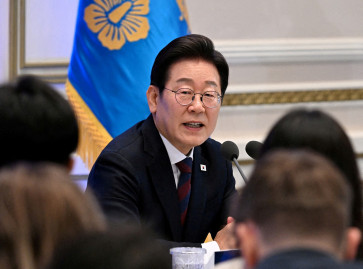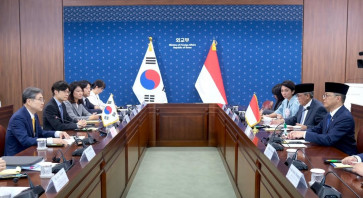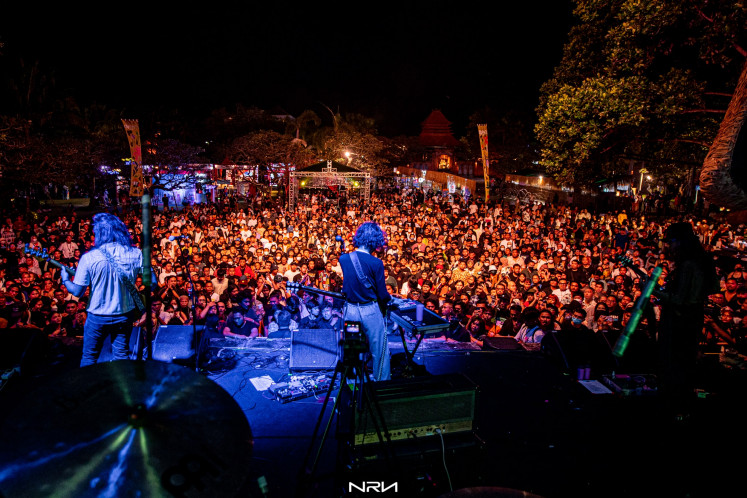Popular Reads
Top Results
Can't find what you're looking for?
View all search resultsPopular Reads
Top Results
Can't find what you're looking for?
View all search resultsFear of communism based on ignorance, expert says
People are afraid of communism because they do not understand it and just accept the single narrative of history provided by the government, an expert has said in the wake of recent suppression of leftist activities.
Change text size
Gift Premium Articles
to Anyone
 Members of the 1965 Murder Victims Research Foundation (YPKP 65) reported their findings on 122 mass graves of 1965 victims across Java and Sumatra in a meeting with Coordinating Political, Legal and Security Affairs Minister Luhut Binsar Pandjaitan recently. The government plans to form a team to verify the graves of mass killing victims. (thejakartapost.com/Viriya Paramita Singgih)
Members of the 1965 Murder Victims Research Foundation (YPKP 65) reported their findings on 122 mass graves of 1965 victims across Java and Sumatra in a meeting with Coordinating Political, Legal and Security Affairs Minister Luhut Binsar Pandjaitan recently. The government plans to form a team to verify the graves of mass killing victims. (thejakartapost.com/Viriya Paramita Singgih)
P
eople are afraid of communism because they do not understand it and just accept the single narrative of history provided by the government over the past 50 years, an expert has said in the wake of recent suppression of leftist activities.
Dave Lumenta, an anthropologist at the University of Indonesia (UI), said most people had no access to the country’s history except through what was taught in schools.
However, those lessons just depicted the chronological order of historical events, not the cause and effect of each event, he said, adding that the history of the now-defunct Indonesian Communist Party (PKI) had also never been told.
On the other hand, Dave said the single narrative of the 1965 mass killings provided by the government had formed collective memories among people in which communists were regarded only as unconscionable atheists.
“Some parties received political legitimation after 1965, including the military. Hence, they have an interest in preserving the old narrative of 1965,” Dave said on Wednesday, referring to the “Dwifungsi” (dual role) of the Indonesian Military (TNI) during the New Order era (1966-1998), with members actively involved in politics and business.
“In fact, it is going to be dangerous if the government keeps nurturing extremist right-wing movements,” he added.
At the third ASEAN Literary Festival in Jakarta last week, which featured discussions on the 1965 massacre, protestors accused event organizers of seeking to promote communism and demanded the annual event be shut down. The event proceeded under police protection.
Meanwhile, the police arrested two clothing sellers in the Blok M shopping mall in South Jakarta on Sunday who were selling T-shirts of German heavy metal band Kreator. The shirts displayed a picture of the hammer and sickle logo used by communist organizations worldwide. However, the police have released them, saying that no treason or insult to the country had occurred.
"Currently, a lot of merchandise and activities reference communism. The President has given an order to take action against this," National Police chief Gen. Badrodin Haiti said at the State Palace on Tuesday.
The kidnapping and murder of six Army generals on Sept.30, 1965, led to a purge of PKI members, sympathizers and their families by the military under Soeharto’s leadership. It is estimated that between 500,000 to 1 million people with any sort of leftist connections, regardless of their age or level of involvement, were massacred.
Soeharto seized power in 1966 with the controversial March 11 Indonesian Presidential Executive Order (Supersemar). The prevention of the dissemination of communism, Leninism and Marxism in Indonesia was later stipulated by a decree of the Temporary People’s Consultative Assembly issued in 1966.
Setara Institute chairman Hendardi said on Wednesday that the truth-revealing process of the 1965 tragedy was often hampered by propaganda claiming it was an attempt to revive the PKI. Hence, he called on President Joko “Jokowi” Widodo to not be distracted from his commitment to resolve the long-neglected case.
“If the propaganda of communism’s revival is still being maintained and affirmed by the government, the main victim will be civil liberties,” Hendardi said.
Meanwhile, Ida Ruwaida Noor, a sociologist at UI, said the government needed to create policies that helped erase the stigma suffered by 1965 victims. Survivors and relatives of the victims were commonly stigmatized and discriminated against to this day.
“There should be a structural intervention by the state as that stigma has a historical dimension,” she said. “Basically, the family, school and press could be the medium to alter the public’s perspective.” (vps/bbn)









